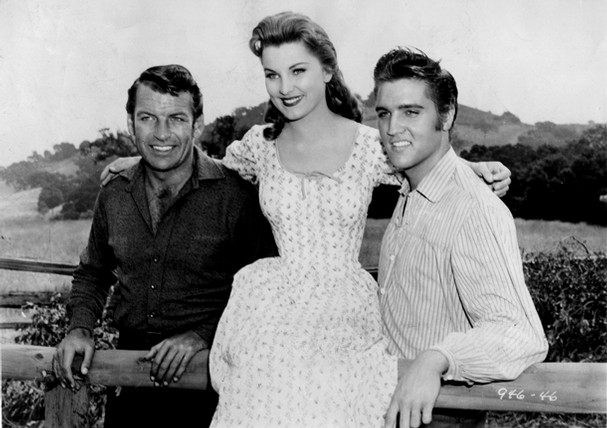
And in a supporting role, no less, although it is easily the emotionally meatiest in the film. And even more surprising (to me, at least): a Civil War-era Western! That’s right, the greasy-haired, pelvis-shaking 50s icon actually does what he does best in a milieu nearly a hundred years outside his comfort zone. But, despite a couple of up-tempo numbers, it’s not as anachronistic as you think. After all, the title song, “Love Me Tender,” was adapted from a Civil War ballad. But when I stared to watch, with no Elvis for the first twenty minutes and a plot about Confederate soldiers stealing payroll money, I thought I had rented the wrong film.
The soldiers are comprised mainly of the three Reno brothers; they rob a train’s cash load for the Confederate cause, but are completely unaware that the war had just ended. Once they get the news, and after some moral soul-searching, they agree to split up the money evenly. The bros return home to the farmstead where the eldest, Vance (whom everyone thought dead), realizes his sweetheart, Cathy, had just married the youngest, Clint. Awkward!
The tensions continue and Vance realizes he must leave, lest the others catch on to his still strong feelings for Cathy. But the Yanks are hot on their trail and decide to bring the boys in for trial, while sealing off the farm so no money can leave the premises. Vance artfully, and honestly, arranges to return the money, but his ex-cohorts break the brothers free from captivity, and soon grow to doubt Vince’s honest intentions. Even worse, they coerce Clint into believing he’s gonna steal away Cathy, and it all comes to head in a shootout, where Clint gullibly shoots and wounds Vince, instantly regrets it, and is in turn shot and killed by the incoming Yanks. Mother Reno is comforted by Vince, who is now ostensibly allowed to marry Cathy.
All right, an all-too convenient resolution for Vince, but of course, he is the film’s lead. It’s really Presley who takes the greater chance here, playing an unlikeable character in the film’s beginning, when he steals away the hero’s true love, and in the final third, when he avariciously hunts down big brother. Of course, it’s all redeemed in his final act of self-sacrifice, but still, it’s certainly not the easy way out. And the Pelvis handles such a balancing act with great aplomb, being careful not to appear either too saintly or too monstrous. And he even works in four songs to boot!
Is this a great film? No, but it’s certainly a good one. Even if its dialogue is not as crisp as it could be, and its acting, despite Presley’s nuances, suffers from the era’s trademark over-theatrics, the story is pretty solid. After all, they are borrowing from some of the greatest literary archetypes of all time: East of Eden, Othello, The Great Train Robbery… I found myself quite involved in this melodrama, and quite frankly had no idea how it was going to wind up. Hey, and let’s credit some darn fine B&W cinematography while we’re at it, looking good in yet another Cinemascope presentation. (Clearly Fox’s trademark)
Oh, and my starlet lusting for the day – Debra Paget, who plays Cathy. Quite the looker, I gotta say, and Elvis himself agreed: he proposed to her, but she had already given her heart to… Howard Hughes (WTF?). But so far in this collection no one could sport a three-buttoned open blouse like she. Her other big hit: a little film called The Ten Commandments. Maybe we’ll see her in that when I do the Paramount collection.
On balance, fun, riveting, you’ll laugh, you’ll cry. Aw, hell, you’ll watch.
Rating: ***


No comments:
Post a Comment